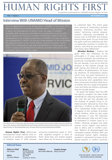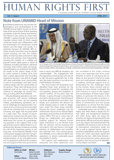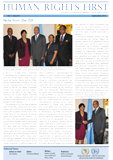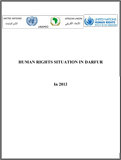Main priorites and objectives
UNAMID Human Rights Section monitors, investigates early warning and reports on human rights violations, sexual gender-based violence (SGBV) and abuses. Furthermore, the Section regularly undertakes judicial monitoring specifically addressing impunity, enhancing capacity of government institutions and the judiciary and key in-country partners, and providing support to the work of Special Procedures of the Human Rights Council, such as the Independent Expert on the Human Rights situation in the Sudan. In addition to mainstreaming human rights in the humanitarian agenda and the peace and political process, the Section has established a platform for constructive dialogue with the Government of Sudan through the Darfur Human Rights Forum and its decentralised Sub-Fora. Human Rights Section further engages with international partners, armed movements, civil society, community leaders, and key stakeholders including UN Agencies to address human rights and Protection of Civilian concerns.
Protection of Civilians: Continue to monitor and ensure and timely documentation and reporting of human rights abuses. The Human Rights section is working with relevant Mission components, UN agencies, government institutions and other key stakeholders to establish a more coordinated and effective early warning rapid response to prevent human right violations, SGBV and provide responses to main protection and concerns. Protection of the internally displaced persons (IDP), women and children as well equal access to economic and social rights will be among highest priority of the UNAMID Human Rights Section.
Contribute to the Establishment of an Enabling Environment: The Human Rights is currently advocating for the establishment of an enabling environment that could foster the full en enjoyment of civil and political rights in Darfur.
Fights against Impunity: The Human Rights Section will continue to raise awareness on human rights violations and SGBV and advocate for the effective functioning of the judiciary and other accountability mechanisms including the newly established National Human Rights Commission, the existing Commission of Inquiry and, other institutions and transitional justice mechanisms provided for in the Doha Document for Peace in Darfur (DDPD). HRS assists Government, parties and key stakeholders in designing a comprehensive rights-based transitional justice strategy.
Sexual Gender-Based Violence: The Section assists in combating violence against women and continues providing support to the State Committees for Combating Violence against Women in the implementation of their action plans. It will also mobilise efforts aimed at the prevention of and responses to SGBV, including institutional development.
Capacity Building and Technical Assistance: The Human Section will continue to build state and non-state actors’ capacity to protect and promote human rights in Darfur. It will also provide technical assistance for the implementation of the recommendations pertaining to Darfur of the UN Human Rights Council Universal Periodic Review of the Republic of the Sudan, and support the Independent Expert on the Situation of Human Rights in Sudan to reflect Darfur concerns and demands in the need assessment and final program for capacity building and technical assistance.
Human Rights in the Darfur Peace Process: The Human Rights Section will focus on the implementation of the human rights provisions under the DDPD while continuing to mainstream human rights into the peace and political process and devising support and technical assistance to the Joint Chief Mediator, Government of Sudan, Parties and other relevant stakeholders.
Positive developments
- Establishment of an effective data collection and analysis system covering the five states of Darfur.
- Increased capacity of the Government of Sudan to protect and promote human rights violations and sexual gender-based violations:
- Establishment by the Government of Sudan of State Committees to combat SGBV, Family and Child Protection Units and Human Rights Libraries and Centres in North, South and West Darfur (2006-2007);
- Establishment of the National Human Rights Commission which will establish decentralized Committees in the five states of Darfur;
- The “Darfur Human Rights Forum” (launched in November 2008) with Advisory Council on Human Rights and Sub Forum in West Criminal Act revised following a “Human Rights” angle (2009)
- More prosecutions of SGBV cases (Prosecution of law enforcement agents and non state actors accused of rape (since early 2009)
- Increased knowledge, expertise on human issues (From August 2008 to June 2011, a total of 54 human rights trainings, 42, 3,860 individuals trained – law enforcement agencies and other national stakeholders at least 30 human rights promotions events and produced related human rights paraphernalia.
- Advancement of justice and accountability agenda:
- Agreement over a comprehensive transitional Justice provisions which encompasses prosecution, truth seeking, reconciliation, institutional reforms and vetting in the DDPD;
- Recent appointment of the New Special Prosecutor and the commitment of the Government of Sudan to established the Special Court o prosecute the gross violation of human rights and breaches to International humanitarian law committed in Darfur since 2003;
- Adoption of a comprehensive human rights agenda within the peace process:
- Human rights and transitional justice chapter and provisions of the DDPD;
- Human rights dimension of the Permanent Security arrangement wealth and power sharing chapters as well the one on return of IDPs and refugees.
 UN
UN United Nations Peacekeeping
United Nations Peacekeeping




